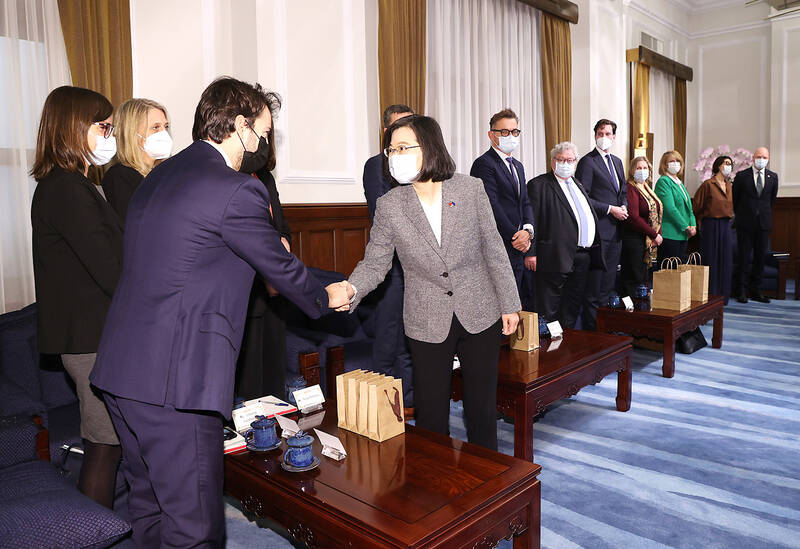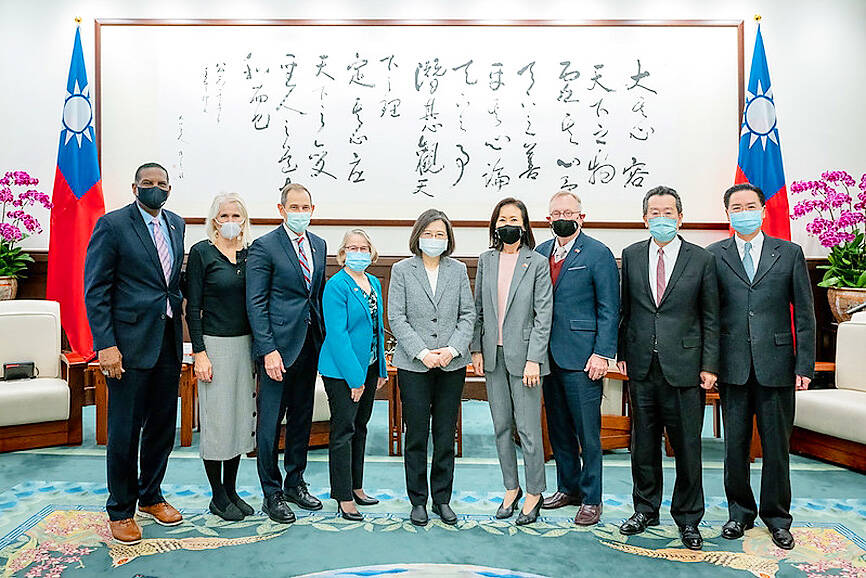Steps should be taken toward establishing a bilateral investment agreement between the EU and Taiwan, European Member of Parliament Anna-Michelle Asimakopoulou said in Taipei yesterday.
Asimakopoulou, a Greek politician who is vice chair of the parliament’s International Trade Committee, is part of a delegation that met with President Tsai Ing-wen (蔡英文) at the Presidential Office.
The EU recognizes its trade and investment partnership with Taiwan as a “strategic relationship with geopolitical implications,” Asimakopoulou said.

Photo: CNA
Further bilateral cooperation on global supply chains would be mutually beneficial in light of the leading role that Taiwan plays with respect to semiconductors, she said.
Given the circumstances, the European Parliament calls on the EU to launch “an impact assessment, a public consultation and a scoping exercise” related to a bilateral investment agreement with Taiwan, she said.
Those assessments and consultations are part of the preparations needed before the two sides can officially begin negotiations on the issue.

Photo courtesy of the Presidential Office
Taiwan and the EU are like-minded partners, with their friendship built on the common values of democracy, rule of law and respect for human rights, she said.
It is in that spirit that the delegation expresses its gratitude to Taiwan for being “on the right side of history” in supporting the EU’s efforts to help Ukraine defend itself in response to “the unconscionable war of [Russian President Vladimir] Putin,” Asimakopoulou said.
She also praised Taiwan for its “measured and responsible reaction to unprovoked and increasing aggression and provocation from China,” referring to military drills launched by Beijing after US House of Representatives Speaker Nancy Pelosi visited Taiwan in early August.
Asimakopoulou reiterated the EU’s stance that even though it diplomatically recognizes Beijing and not Taipei, it believes the “status quo” in the Taiwan Strait “cannot be changed unilaterally,” as it opposes “the use or threat of force or economic coercion against Taiwan from China.”
Tsai earlier welcomed the delegation, the first official visit to Taiwan by a delegation representing the trade committee.
She also thanked the European Parliament and its committees for this year passing more than 10 resolutions in support of Taiwan, including measures backing the nation’s international participation, and calling for peace and security across the Taiwan Strait.
The 13-member delegation also met with Premier Su Tseng-chang (蘇貞昌) and other senior officials from the National Development Council, the Ministry of Economic Affairs, the Office of Trade Negotiations and the Ministry of Foreign Affairs during their stay, which began Sunday and ends today.
Also yesterday, Tsai welcomed a group of visiting US lawmakers at the Presidential Office.
The all-Republican group led by US Representative John Curtis and including US representatives Mariannette Miller-Meeks, Burgess Owens and Michelle Steel is in Taiwan from Saturday through tomorrow.
The US group’s visit means that 36 US representatives and senators have visited Taiwan this year, reflecting strong bipartisan support for Taiwan, the foreign ministry said.
During their meeting with Tsai, Curtis, who lived in Taiwan in 1979 and 1980 as a missionary, told the president that he has since then witnessed Taiwan’s dramatic change into a vibrant democracy.
“I arrived just after the end of the defense treaty and the switch of diplomatic recognition [Washington recognizing Beijing] and the passage of the Taiwan Relations Act,” he said.
He said that although it was a difficult time for Taiwan, he appreciated how warmly he was welcomed by the people of Taichung, Miaoli County and Taipei’s Neihu District (內湖), places he lived at the time.
The delegation’s visit was to be a testament to the US Congress’ strong support for Taiwan, Curtis said.

The CIA has a message for Chinese government officials worried about their place in Chinese President Xi Jinping’s (習近平) government: Come work with us. The agency released two Mandarin-language videos on social media on Thursday inviting disgruntled officials to contact the CIA. The recruitment videos posted on YouTube and X racked up more than 5 million views combined in their first day. The outreach comes as CIA Director John Ratcliffe has vowed to boost the agency’s use of intelligence from human sources and its focus on China, which has recently targeted US officials with its own espionage operations. The videos are “aimed at

STEADFAST FRIEND: The bills encourage increased Taiwan-US engagement and address China’s distortion of UN Resolution 2758 to isolate Taiwan internationally The Presidential Office yesterday thanked the US House of Representatives for unanimously passing two Taiwan-related bills highlighting its solid support for Taiwan’s democracy and global participation, and for deepening bilateral relations. One of the bills, the Taiwan Assurance Implementation Act, requires the US Department of State to periodically review its guidelines for engagement with Taiwan, and report to the US Congress on the guidelines and plans to lift self-imposed limitations on US-Taiwan engagement. The other bill is the Taiwan International Solidarity Act, which clarifies that UN Resolution 2758 does not address the issue of the representation of Taiwan or its people in

US Indo-Pacific Commander Admiral Samuel Paparo on Friday expressed concern over the rate at which China is diversifying its military exercises, the Financial Times (FT) reported on Saturday. “The rates of change on the depth and breadth of their exercises is the one non-linear effect that I’ve seen in the last year that wakes me up at night or keeps me up at night,” Paparo was quoted by FT as saying while attending the annual Sedona Forum at the McCain Institute in Arizona. Paparo also expressed concern over the speed with which China was expanding its military. While the US

SHIFT: Taiwan’s better-than-expected first-quarter GDP and signs of weakness in the US have driven global capital back to emerging markets, the central bank head said The central bank yesterday blamed market speculation for the steep rise in the local currency, and urged exporters and financial institutions to stay calm and stop panic sell-offs to avoid hurting their own profitability. The nation’s top monetary policymaker said that it would step in, if necessary, to maintain order and stability in the foreign exchange market. The remarks came as the NT dollar yesterday closed up NT$0.919 to NT$30.145 against the US dollar in Taipei trading, after rising as high as NT$29.59 in intraday trading. The local currency has surged 5.85 percent against the greenback over the past two sessions, central